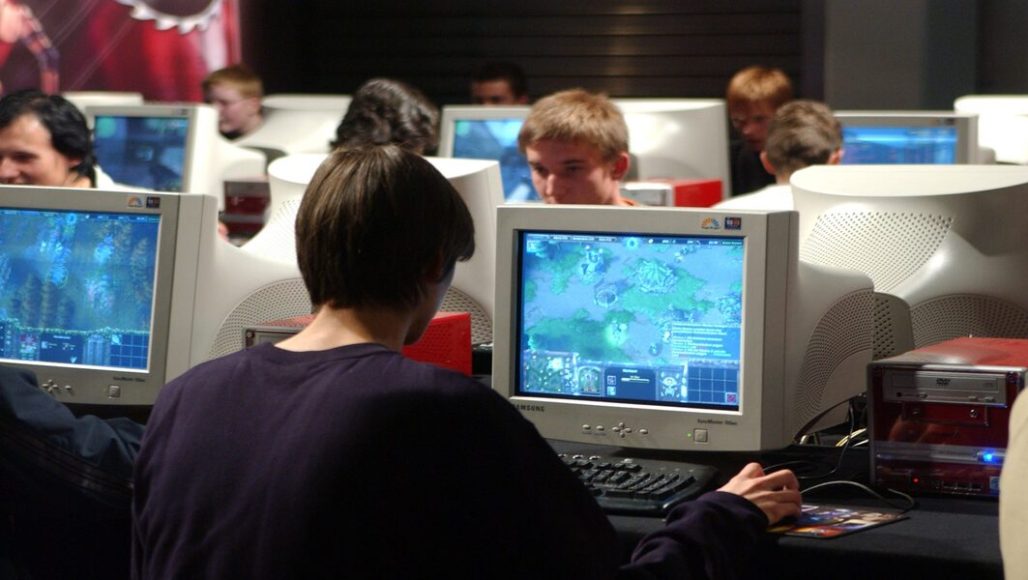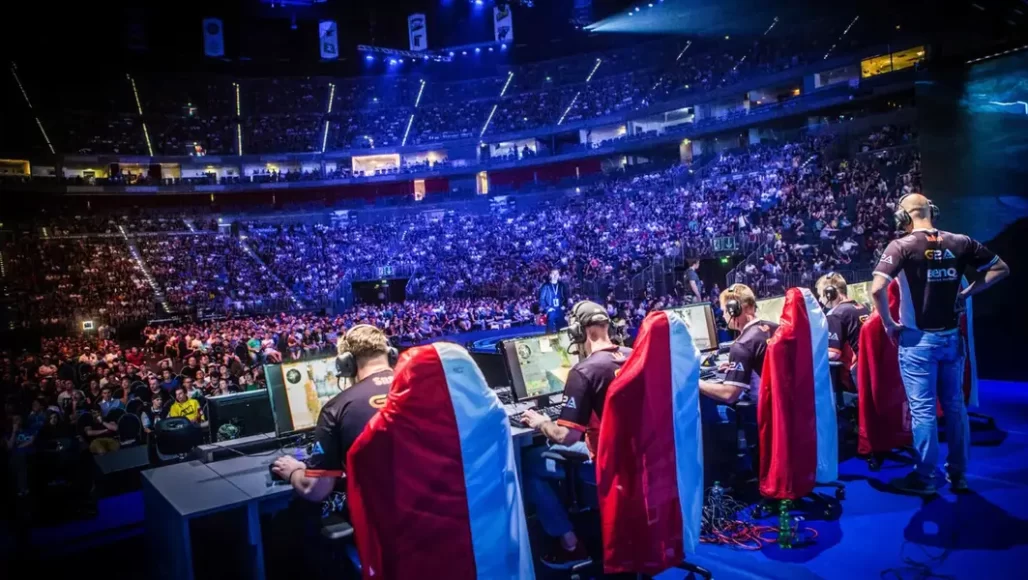History of Esports: A Comprehensive Look at the Evolution

The history of esports is a fascinating journey from humble beginnings to a global phenomenon. What began as a niche hobby for gaming enthusiasts has transformed into a multi-billion dollar industry, captivating millions of fans worldwide. Understanding this evolution offers valuable insights into how esports have become an integral part of the modern entertainment landscape.
The Origins: How Did Esports Start?
The origins of esports can be traced back to the 1970s, a period when video games were still in their early stages of development. Unlike games of chance like video poker, these were skill-based games that sparked a new form of competition. The first known competitive gaming event took place at Stanford University on October 19, 1972. The game featured was Spacewar!, a space combat simulation created in 1962 by Steve Russell. Stanford students participated in what was called the “Intergalactic Spacewar Olympics,” with the top prize being a year-long subscription to Rolling Stone magazine. Although humble by today’s standards, this event set the foundation for the future of esports.
The concept of competitive gaming gained traction during the late 1970s and early 1980s with the rise of arcade games. Titles like Space Invaders and Pac-Man became cultural icons, and high score competitions were commonplace in arcades across the United States. In 1980, Atari organized the Space Invaders Championship, which attracted over 10,000 participants, making it the first large-scale video game competition and marking a significant milestone in the history of esports.

The Golden Age of Arcade Gaming: When Was Esports Invented?
The early 1980s are often referred to as the Golden Age of arcade gaming, a period that played a crucial role in the invention and popularization of esports. During this time, video games became a mainstream form of entertainment, and competitive gaming began to gain wider recognition. The introduction of Twin Galaxies in 1981 by Walter Day provided a centralized platform for tracking world records in arcade games, further legitimizing the competitive aspect of gaming.
The 1980s also saw the emergence of organized tournaments, with Twin Galaxies sponsoring events such as the North American Video Game Olympics in 1982. Additionally, the establishment of the U.S. National Video Game Team in 1983 marked an important step in the professionalization of esports. However, despite these developments, the competitive gaming scene remained relatively niche, limited to arcade aficionados and early home console enthusiasts.
The Rise of PC Gaming: Esports History Timeline
The late 1980s and early 1990s marked a significant shift in the esports history timeline, as the focus began to move from arcade games to personal computers. The advent of PC gaming allowed for more complex and varied gaming experiences, which, in turn, spurred the growth of competitive gaming.
One of the earliest and most influential games in the history of esports was Doom, released in 1993. Doom popularized the first-person shooter (FPS) genre and introduced multiplayer deathmatches, where players could compete against each other over a local area network (LAN). This concept of multiplayer competition laid the foundation for many of the esports games that dominate the scene today.
The late 1990s saw the rise of several iconic esports titles, including StarCraft (1998) and Counter-Strike (1999). StarCraft became particularly popular in South Korea, where it sparked a national craze and led to the establishment of professional leagues and teams. By the early 2000s, South Korea had become the epicenter of the esports world, with millions of fans tuning in to watch matches on television and the internet.

The Globalization of Esports: Who Invented Esports?
While the origins of esports can be traced back to the United States, the globalization of esports was largely driven by South Korea. The country’s rapid adoption of broadband internet in the late 1990s and early 2000s created the perfect environment for online gaming to flourish. The Korean Esports Association (KeSPA) was established in 2000, further solidifying the country’s role in shaping the modern esports industry.
As esports gained popularity in South Korea, other regions began to take notice. Europe and North America saw the rise of competitive gaming leagues and tournaments, with games like Warcraft III, Quake, and Unreal Tournament becoming staples of the esports scene. The establishment of major international tournaments, such as the World Cyber Games (WCG) in 2000 and the Electronic Sports World Cup (ESWC) in 2003, marked the beginning of esports as a global phenomenon.
The mid-2000s witnessed the introduction of streaming platforms like Twitch (launched in 2011), which revolutionized the way esports were consumed. These platforms allowed fans to watch live matches from anywhere in the world, further accelerating the growth of the industry. By the late 2010s, esports had become a mainstream form of entertainment, with millions of viewers and significant corporate sponsorships.
The Modern Era: Esports as a Mainstream Industry
Today, esports is a billion-dollar industry with a global audience. According to Newzoo, a leading provider of esports analytics, the global esports market was valued at $1.1 billion in 2020, with a projected annual growth rate of 9.3%. The number of esports viewers worldwide was estimated at 495 million in 2020, with 223 million classified as enthusiasts who regularly follow the scene.
The rise of esports has also led to the professionalization of the industry. Top players can earn millions of dollars in prize money, sponsorships, and streaming revenue. For example, Kyle “Bugha” Giersdorf won $3 million in the Fortnite World Cup in 2019, a testament to the lucrative opportunities available in esports.
Major esports events now rival traditional sports in terms of viewership and production value. The 2019 League of Legends World Championship Finals drew over 100 million viewers, surpassing the Super Bowl that year. These events are often held in large arenas, with thousands of fans attending in person and millions more watching online.

Key Milestones in Esports History
To better understand the evolution of esports, it’s helpful to look at some of the key milestones that have shaped the industry:
| Year | Milestone |
|---|---|
| 1972 | First competitive gaming event at Stanford University. |
| 1980 | Atari’s Space Invaders Championship. |
| 1981 | Twin Galaxies founded, first centralized gaming records. |
| 1983 | U.S. National Video Game Team established. |
| 1993 | Release of Doom, popularizing multiplayer deathmatches. |
| 1998 | StarCraft launches, sparking esports boom in South Korea. |
| 2000 | World Cyber Games founded. |
| 2011 | Twitch launches, revolutionizing esports streaming. |
| 2019 | League of Legends World Championship draws 100 million viewers. |
The Future of Esports
Looking ahead, the future of esports is undeniably promising. As technology continues to advance, particularly in areas like virtual reality and augmented reality, the possibilities for new and innovative forms of competition are immense. Unlike traditional gaming machines such as slot machines, which includes some strategies but mostly rely on chance, esports is driven by skill and strategy, making it an increasingly respected form of entertainment. The growing acceptance of esports in mainstream culture, evidenced by its inclusion in events like the Asian Games, even suggests that competitive gaming might one day earn recognition as an Olympic sport.
Furthermore, the rising investment from major corporations and sports franchises points to the continued expansion of esports, both in scale and influence. As the boundaries between traditional sports and esports become increasingly blurred, it’s evident that the story of esports is still unfolding.
In conclusion, the evolution of esports from a small, niche hobby to a global powerhouse underscores the enduring appeal of competitive gaming. Unlike the passive experience of playing slot machines, esports engages players and audiences alike with its dynamic and strategic nature. With its rich history and promising future, esports has established itself as a significant cultural and economic force in the 21st century. Whether you’re a longtime fan or new to the scene, understanding the history of esports offers valuable insight into this rapidly evolving industry.

FAQ
Esports started in the early 1970s, with the first recorded competitive gaming event being the “Intergalactic Spacewar Olympics” at Stanford University in 1972. The popularity of arcade games in the late 1970s and 1980s further contributed to the rise of competitive gaming, leading to the first large-scale tournament, the Space Invaders Championship, organized by Atari in 1980.
Esports, as we know it today, began taking shape in the early 1980s with the rise of arcade gaming and organized tournaments. The exact “invention” of esports is difficult to pinpoint, but the early 1980s are generally considered the period when competitive gaming began to formalize and gain recognition.
Esports wasn’t invented by a single individual but rather evolved through the contributions of many gamers, developers, and organizations over time. Early pioneers like Steve Russell, who developed Spacewar!, and companies like Atari, which organized the first major gaming tournament, played crucial roles in the development of esports.
Esports has grown from small, niche competitions into a global industry worth over $1 billion. With the rise of internet connectivity and streaming platforms like Twitch, esports now attracts millions of viewers and participants worldwide. Major tournaments can fill large arenas and draw viewership numbers that rival traditional sports events.
South Korea played a pivotal role in the growth of esports, particularly in the late 1990s and early 2000s. The country embraced esports with the establishment of professional leagues, government support through the Korean Esports Association (KeSPA), and a nationwide passion for games like StarCraft. South Korea’s influence helped set the stage for esports to become a global phenomenon.
Yes, many people have made successful careers in esports. Professional players can earn significant incomes through tournament winnings, sponsorships, and streaming. Additionally, there are career opportunities in areas like coaching, event organization, broadcasting, and content creation within the esports industry.
The future of esports looks bright, with continued growth expected in terms of viewership, revenue, and mainstream acceptance. Advancements in technology, such as virtual reality, could introduce new formats and experiences. Moreover, esports is increasingly being recognized alongside traditional sports, with discussions about its potential inclusion in events like the Olympics.